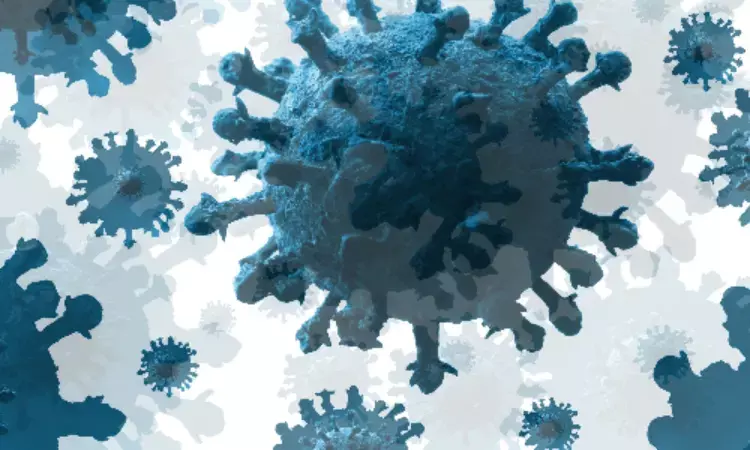- Home
- Medical news & Guidelines
- Anesthesiology
- Cardiology and CTVS
- Critical Care
- Dentistry
- Dermatology
- Diabetes and Endocrinology
- ENT
- Gastroenterology
- Medicine
- Nephrology
- Neurology
- Obstretics-Gynaecology
- Oncology
- Ophthalmology
- Orthopaedics
- Pediatrics-Neonatology
- Psychiatry
- Pulmonology
- Radiology
- Surgery
- Urology
- Laboratory Medicine
- Diet
- Nursing
- Paramedical
- Physiotherapy
- Health news
- Fact Check
- Bone Health Fact Check
- Brain Health Fact Check
- Cancer Related Fact Check
- Child Care Fact Check
- Dental and oral health fact check
- Diabetes and metabolic health fact check
- Diet and Nutrition Fact Check
- Eye and ENT Care Fact Check
- Fitness fact check
- Gut health fact check
- Heart health fact check
- Kidney health fact check
- Medical education fact check
- Men's health fact check
- Respiratory fact check
- Skin and hair care fact check
- Vaccine and Immunization fact check
- Women's health fact check
- AYUSH
- State News
- Andaman and Nicobar Islands
- Andhra Pradesh
- Arunachal Pradesh
- Assam
- Bihar
- Chandigarh
- Chattisgarh
- Dadra and Nagar Haveli
- Daman and Diu
- Delhi
- Goa
- Gujarat
- Haryana
- Himachal Pradesh
- Jammu & Kashmir
- Jharkhand
- Karnataka
- Kerala
- Ladakh
- Lakshadweep
- Madhya Pradesh
- Maharashtra
- Manipur
- Meghalaya
- Mizoram
- Nagaland
- Odisha
- Puducherry
- Punjab
- Rajasthan
- Sikkim
- Tamil Nadu
- Telangana
- Tripura
- Uttar Pradesh
- Uttrakhand
- West Bengal
- Medical Education
- Industry
Paxlovid reduces COVID-19 severity by 79 % to 89 % when given in first five days of testing positive

USA: An original investigation on Infectious diseases published in the Lancet has addressed the effectiveness of vaccination in preventing the severity of COVID-19 disease (SARS-CoV-2). The reduction in disease severity and infection mitigates the disease burden. The disease outcomes like hospitalisation and death remain a cause of concern in the vaccinated population, especially among those with comorbidities and the elderly. The researchers have mentioned that nirmatrelvir–ritonavir reduces this risk within 30 days.
It is already known that oral nirmatrelvir–ritonavir is used in patients aged 12 years or older in the USA with a history of mild-to-moderate COVID-19. These are those patients who are at risk of disease progression to severity. Considering the background mentioned above, researchers established the effectiveness of nirmatrelvir–ritonavir in reducing COVID-19 severity by preventing hospital admissions and death in an outpatient prescribing context in the USA.
This was matched observational outpatient cohort study in the Kaiser Permanente Southern California healthcare system.
The data were extracted from electronic health records of non-hospitalised receiving positive SARS-CoV-2 PCR test results and had yet to receive another positive test result within the preceding 90 days.
The outcomes were compared between people receiving nirmatrelvir–ritonavir and those not receiving nirmatrelvir–ritonavir by matching cases by date, age, sex, clinical status, history of vaccination, comorbidities, healthcare seeking during the previous year, and BMI.
The primary endpoint was estimating the effectiveness of nirmatrelvir–ritonavir in preventing hospital admissions or death within 30 days of a positive test for SARS-CoV-2.
The study points include the following:
- There were 7274 nirmatrelvir–ritonavir recipients and 126 152 non-recipients with positive SARS-CoV-2 tests.
- Five thousand four hundred seventy-two treatment recipients constituting 75.2 %, and 84 657, comprising 67·1% non-recipients, were tested within five days of onset of symptoms.
- Within 30 days of a positive test for SARS-CoV-2, Nirmatrelvir–ritonavir had an overall estimated effectiveness of 53·6% in preventing hospital admission or death.
- When nirmatrelvir–ritonavir was dispensed within five days of symptom onset, this was increased to 79·6%.
- The estimated effectiveness of nirmatrelvir–ritonavir was 89·6% within the subgroup tested within five days of symptom onset and treatment given on the test day.
Researchers said, “In a setting with high levels of COVID-19 vaccine uptake, there is reduced risk of admission of hospitals and death on giving nirmatrelvir–ritonavir effectively within 30 days of a positive SARS-CoV-2 test.”
The study was funded by US Centers for Disease Control and Prevention and the US National Institutes of Health.
Further reading:
https://www.thelancet.com/journals/laninf/article/PIIS1473-3099(23)00118-4/fulltext#%20
BDS, MDS in Periodontics and Implantology
Dr. Aditi Yadav is a BDS, MDS in Periodontics and Implantology. She has a clinical experience of 5 years as a laser dental surgeon. She also has a Diploma in clinical research and pharmacovigilance and is a Certified data scientist. She is currently working as a content developer in e-health services. Dr. Yadav has a keen interest in Medical Journalism and is actively involved in Medical Research writing.
Dr Kamal Kant Kohli-MBBS, DTCD- a chest specialist with more than 30 years of practice and a flair for writing clinical articles, Dr Kamal Kant Kohli joined Medical Dialogues as a Chief Editor of Medical News. Besides writing articles, as an editor, he proofreads and verifies all the medical content published on Medical Dialogues including those coming from journals, studies,medical conferences,guidelines etc. Email: drkohli@medicaldialogues.in. Contact no. 011-43720751


